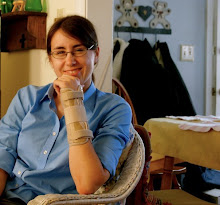Below is the text of a response written for a class assignment by my friend Chris Golden, who had the opportunity to go hear from former President Jimmy Carter about the crisis in Darfur and other topics. Unfortunately I was unable to attend, but I enjoyed reading Chris's thoughts on the event and so thought I would post them here.
~~~~~~~~~~~~~~~~~~~~~~~~~~~~~~~~
As Dr. Cornelius Kerwin, President of American University, said in his introduction, “the opportunity to hear from a former President of the United States on any topic is uncommon.” It was with the awe and respect for the office of President and the former officeholder that Nicole and I attended an address by Former US President James Earl Carter, Jr. on Wednesday October 24th. The topic was Darfur and specifically President Carter’s work with The Elder’s Group, a group of what he called “political has-beens” who have been established to solve some of the world’s most complex issues. Carter outlined the four areas of The Elder’s work: stopping the violence and renewing attempts at democracy in Burma, democratization in Zimbabwe, a comprehensive plan to bring peace to the Middle East, and the Crisis in Sudan including the Darfur genocide.
The CEO of the Elder’s Group is Dr. Robert Pastor, a Vice President at American University. In his flattering introduction, Pastor declared that Carter is “the best ex-president the US has ever seen,” which is the tag line that has come to signify Jimmy Carter. Indeed in his opening words, President Carter repeated the familiar joke of a young child saying to his father, “Daddy, when I grow up, I want to be a former president.” In his introduction, Pastor cited many of Carter’s foreign policy and diplomatic successes during his administration, many of which I have seen as lost or blurred with other presidents in the hindsight of American history. “President Carter normalized relations with China including spiritual relations with Taiwan,” Pastor said indicating that this normalization had a greater effect than President Nixon’s famous trip to China. “Because he negotiated the Panama Canal Treaty,” Pastor said, “the Canal is still open and doing better.” Pastor said that in the first three years of his Presidency, President Carter accomplished more in terms of foreign policy than any other United States President except for FDR & LBJ. “He is one of our greatest Presidents and one of our best past-Presidents,” he said.
This introduction made me think more about the Carter presidency, which is often cited as unsuccessful because of the Iran Hostage Crisis, the Iranian Oil Embargo, and the national climate of malaise which persisted during his four years in the White House. Pastor made no mention of these challenges in his introduction and I would argue that when the Carter Presidency is studied with the advantage of independent historical thought (i.e. historians who were not alive during the Carter Presidency), the challenging and difficult aspects of the Carter Years will have more prevalence. However, I was also thinking during the introduction that when the Former President passes away (he remains vigorously active and in excellent health, however), that the successes of his Administration will again be considered by the nation as a whole.
President Carter gave a brief but understandably detailed account of the Crisis in Sudan, the division between the North and South, and the ethnic cleansing (as a technical point, Carter does not go as far as to use the term “genocide”) in Darfur. Carter said that he has visited Sudan at least once a year since 1988 and has been actively involved with negotiations between leaders within the country and with neighboring nations. Carter directly criticized the attention that Darfur has received in both the Clinton and Bush Administrations and openly chastised both leaders. However, Carter stopped short of offering specific policy changes that he would urge the US Government to impact immediately—he always phrased them as occurring in the future, meaning the next administration. It is common for former Presidents to try, as much as possible, to not criticize the current administration or answer questions like “If I were in office, I would do this…” because it can limit the effectiveness of decisions made by the Current Chief Executive. If one follows the news, however, they will find that of late Carter has had problems with keeping his personal and partisan views out of the public limelight, as when he said recently that Vice President Dick Cheney has been “a disaster for our country.”
One of the most interesting moments during the President’s hour-long talk was when he put himself in the shoes of the next President of the United States and offered suggestions as to what should be said in his/her inaugural address. “I hope that the next President will be a Democrat,” Carter said, “and then there will be an all-out effort to support peace,” specifically referring to peace in the Middle East. President Carter said that the 44th President should immediately abdicate the “new policy of pre-emptive war,” assure that the United States would “never again torture a person and adhere to all International agreements on torture,” work towards a permanent comprehensive peace plan in the Middle East (“I hope that the next President will announce at the initiation of their term an effort for comprehensive peace,” he said”), lead an effort to protect the environment and combat global warming, and insist that “we will raise high the banner of human rights” again.
It was an honor and a privilege to hear from President Jimmy Carter. Carter is the feature of a new documentary called Jimmy Carter: Man from Plains, and I will undoubtedly think about my front-row vantage point to his thoughts about the state of the world today, its troubles, its tribulations, and its future. Jimmy Carter may be a former President but he is forever an Ambassador of the United States.
Friday, October 26, 2007
Subscribe to:
Post Comments (Atom)

No comments:
Post a Comment